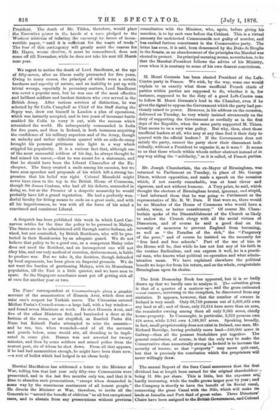We regret to notice the death of Lord Sandhurst, at
the age of fifty-seven, after an illness really protracted for five years. Owing to many causes, the principal of which were a certain hardness and asperity of nature, and an inability to put up with trivial wrongs, especially in pecuniary matters, Lord Sandhurst was never a popular man, but he was one of the most effective and brilliant soldiers and hardest thinkers who ever served in the British Army. After various services of distinction, he was selected by Sir Colin Campbell as Chief of the Staff during the Sepoy war, drew out himself in London a plan of operations, which was instantly accepted, and in two years of incessant battle enabled Sir Colin to carry it out, with the success which astonished the world. He subsequently commanded in India for five years, and then in Ireland, in both instances acquiring the confidence of his military superiors and of the Army, though an unlucky and rather ridiculous quarrel with an aide-de-camp brought his personal grittiness into light in a way which crippled his popularity. It is a curious fact that, although one of the most successful soldiers of his day, he always thought he had missed his career,—that he was meant for a statesman, and that he should have been the Liberal Chancellor of the Ex- chequer, The fancy created a smile among his enemies, but we have seen speeches and proposals of his which left a strong im- pression that his belief was right. Colonel Mansfield might never have risen to the top in the British House of Commons, though Sir James Graham, who had all his defects, succeeded in doing so, but as the Premier of a despotic monarchy he would probably have left a grand reputation. He had a perfectly won- derful faculty for fitting means to ends on a great scale, and with all his imperiousness, he was with all the force of his mind a convinced and consistent Liberal.


































 Previous page
Previous page